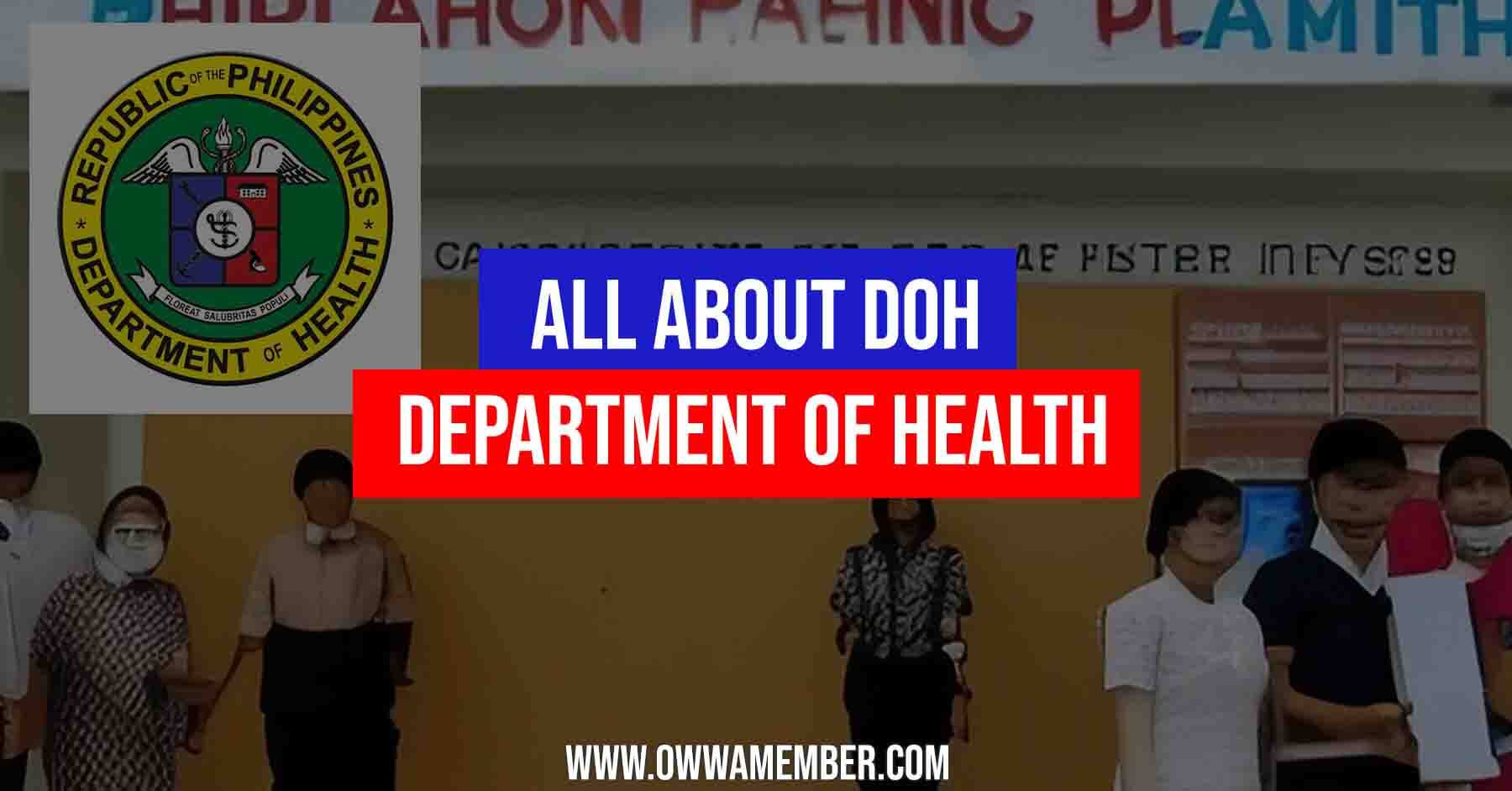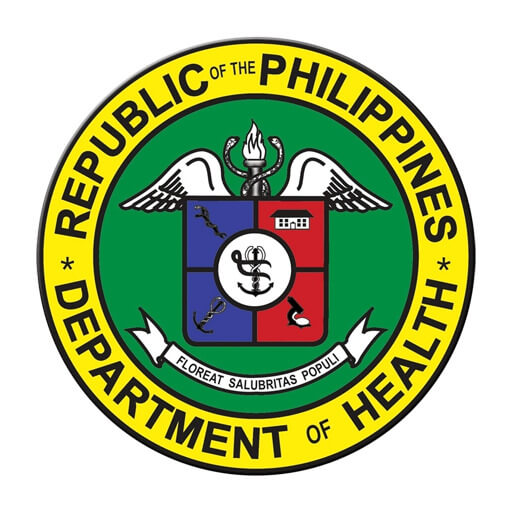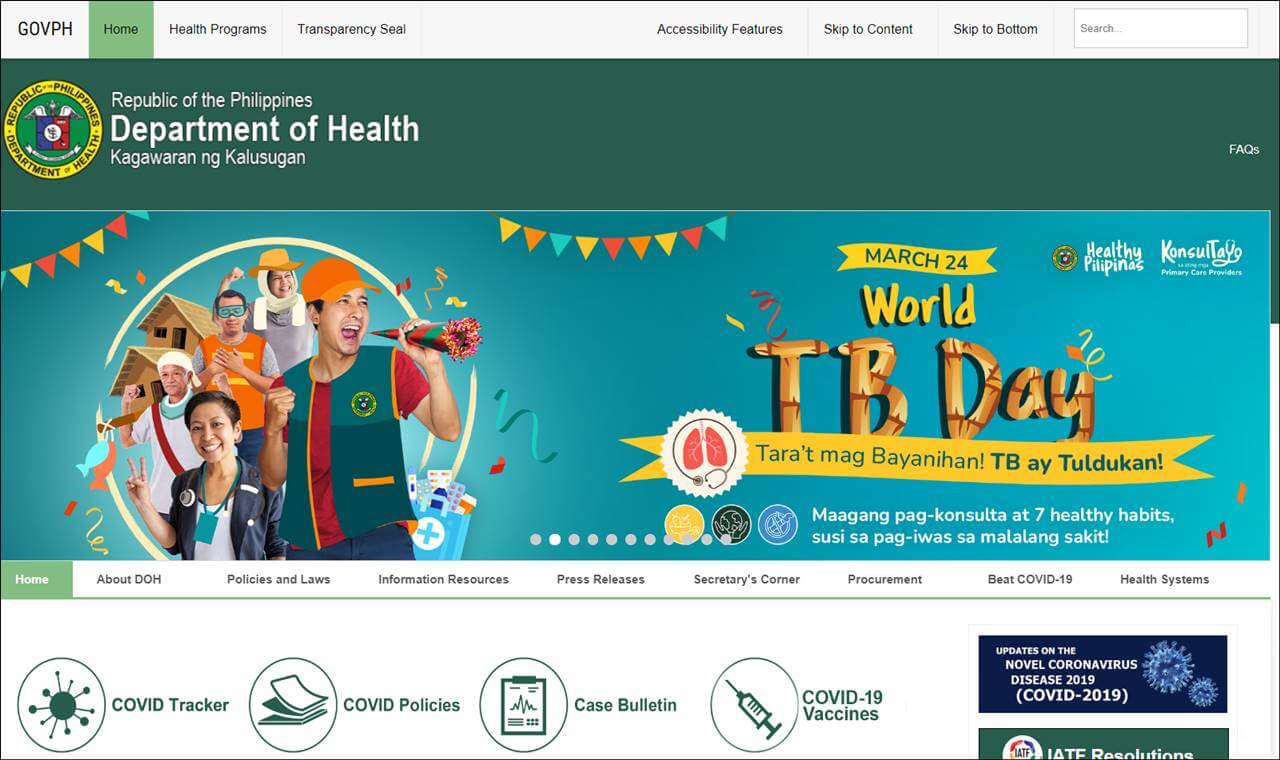The Department of Health (DOH) is the principal health agency and national health policy-maker and regulatory institution in the Philippines. Having said that, it holds the overall technical authority on health, health plans, policies, goods, and services in the country and has been doing so since it was officially established in 1944.
Also Read: PRC – Philippine Red Cross – Purpose, Functions and Responsibilities
The DOH is responsible for the implementation of national health programs and projects, as well as the mobilization and allocation of resources to support them. It monitors the health status of Filipinos and manages health emergencies. It also works with other government agencies and non-governmental organizations to develop effective strategies to address public health concerns.
As an agency that specializes in health, the DOH basically plays three roles for the health sector: health leader, enabler and capacity-builder, and administrator of specific services. Keep reading to learn about how DOH carries out its functions to help Filipinos nationwide.
Contents
- What is the meaning of DOH?
- When did the DOH launch?
- What does the Department of Health do?
- What are the DOH’s principles of management?
- What is the function of the Department of Health in the Philippines?
- What are the attached agencies of the DOH?
- DOH Health Programs
- Video: DOH @ 120 Years
- Frequently Asked Questions
- Summary

What is the meaning of DOH?
DOH is an abbreviation for the Department of Health. It is a government agency in-charge of developing, promoting, and regulating the health sector in the country so it can serve the Filipinos better.
When did the DOH launch?
The Department of Health (DOH) started off as the military Board of Health on September 10, 1898. It was originally established to care for injured American troops, but eventually evolved into the Bureau of Health which is dedicated to improving public health. In the 1940s, it changed into the Department of Health and Public Welfare before becoming the Department of Education, Health, and Public Welfare. In 1944, it became the Department of Health it is now, with both the Bureau of Hospitals and the Bureau of Quarantine under its management.
What does the Department of Health do?
The Department of Health (DOH) serves as the principal health agency in the country. It plays three major roles: as a health leader, enabler and capacity-builder, and as an administrator of specific services. As a government agency, the DOH is also tasked to ensure that the general public has access to basic health services and quality health care and to regulate the providers of health goods and services.
Its mandate also includes developing national plans, technical standards, and health guidelines for the health sector to abide by. It also provides special tertiary healthcare services and technical assistance to both providers and stakeholders in the health industry.

- department of health philippines logo
What are the DOH’s principles of management?
Together, these vision, mission, and values statements provide direction for everything that the Department of Health engages in in support of the Filipino people.
Mission
DOH’s mission has always been to lead the country in the development of a productive, resilient, equitable and people-centered health system for Universal Health Care (UHC).
Vision
The agency hopes that the Filipinos would become among the healthiest people in Southeast Asia by 2022, and in the entirety of Asia by 2040.
Core Values
These values serve as the guiding principles that DOH adheres to when it operates as stewards of health:
- Integrity
The DOH strives to uphold truth and pursue honesty, accountability, and consistency in performing its functions.
- Excellence
It always strives for the best, making sure it is up-to-date in terms of innovation so it will continue to function effectively and efficiently, while being pro-action, dynamic, and open to change.
- Compassion and respect for human dignity
Whilst DOH upholds the quality of life, it also encourages respect for human dignity, sympathy, and benevolence, especially towards people in need.
- Commitment
The department commits to achieve its vision for the health and development of future generations.
- Professionalism
The DOH performs its functions professionally, exhibiting the highest ethical standards, principles of accountability, and full responsibility.
- Teamwork
The DOH employees work together with a result-oriented mindset.
- Stewardship of the health of the people
Being stewards of health for the people, the Department pursues sustainable development and care for the environment.
What is the function of the Department of Health in the Philippines?
The Department of Health (DOH) is mandated to develop national plans, technical standards, and guidelines on health and serve as the regulator of all health services and products. It is also the designated provider of special tertiary health care services and technical assistance both to health providers and the stakeholders.
What are the attached agencies of the DOH?
Together with its attached agencies, the DOH performs its roles and functions continuously in a bid to improve the healthcare system in every region of the Philippines.
The DOH attached agencies are as follows:
Philippine Institute of Traditional and Alternative Health Care (PITAHC)
Address: Matapang St East Avenue Center Compound, Diliman, Q.C.
Contact Person: Annabelle De Guzman, MD, FPAFP, MHA, MA MED, CESE
Position: Director General
Tel. No.: 376-3067 (TF), 376-30-68
Email address: pitahc@gmail.com
Philippine Health Insurance Corporation (PHIC)
Address: Citystate Centre Building, 709 Shaw Boulevard, Pasig City
Contact Person: Eli Dino D. Santos
Position: OIC-President and CEO
Tel. No.: 441-7444, 441-7442
Philippine National Aids Council (PNAC)
Address: Ground Flr. Bldg 12, San Lazaro Compound, Sta. Cruz, Manila
Contact Person: Dr. Joselito R. Feliciano
Position: OIC-Executive Director IV
Tel. No.: 8651-7800 loc. 2212
Email address: pnac_sec@yahoo.com
National Nutrition Council (NNC)
Address: Nutrition Building, 2232 Chino Roces Avenue, Taguig City
Contact Person: Dr. Azucena M. Dayanghirang, MCH, CESO III
Position: Assistant Secretary and Executive Director
Tel. No.: (63 2) 818-7398, 892-4271
info@nnc.gov.ph
Email address: apet.dayanghirang@nnc.gov.ph, apet2265@yahoo.com
DOH Health Programs
- Adolescent Health and Development Program
- Aedes-Borne Viral Diseases Prevention and Control Program
- Belly Gud for Health
- Blood Donation Program
- Cancer Control Program
- Child Health and Development Strategic Plan Year 2001-2004
- Chronic-Kidney Disease Prevention and Control
- Climate Change
- Committee of Examiners for Massage Therapy (CEMT)
- Committee of Examiners for Undertakers and Embalmers
- Dengue Prevention and Control Program
- Dental Health Program
- Early Childhood Care Development Program
- Emerging and Re-emerging Infectious Disease Program
- Environmental Health Programs
- Expanded Program on Immunization
- Family Planning Program
- Filariasis Elimination Program
- Food and Waterborne Diseases Prevention and Control Program
- Food Fortification Program
- Garantisadong Pambata
- Healthy and Productive Ageing Program
- HIV, AIDS and STI Prevention and Control Program
- Uman Resource for Health Network
- Immunization Program
- Infant and Young Child Feeding Program
- Integrated Helmnith Control Program
- Integrated Management of Childhood Illness Program
- Inter Local Health Zone
- Knockout Tigdas 2007
- Leprosy Control Program
- Lifestyle-related Diseases
- Malaria Control and Elimination Program
- Mental Health Program
- Micronutrient Supplementation Program
- National Family Planning Program
- National Leprosy Control Program
- National Safe Motherhood Program
- National Tuberculosis TB Control Program
- Newborn Hearing Screening Program
- Newborn Screening Program
- Occupational Health Program
- Oral Health Program
- Persons with Disabilities
- Philippine Cancer Control Program
- Philippine Medical Travel and Wellness Tourism Program
- Philippine Organ Donation and Transplant Program
- Prevention of Blindness Program
- Province-wide Invesment Plan for Health (PIPH)
- Public Health Associate Deployment Program (PHADP)
- Public-Private Partnership for Health Program
- Rabies Prevention and Control Program
- Rural Health Midwives Placement Program (RHMPP) / Midwifery Scholarship Program of the Philippines (MSPP)
- Safe Motherhood Program
- Sanitation Program
- Schistosomiasis Control and Elimination Program
- Smoking Cessation Program
- Tuberculosis Control Program
- Unang Yakap (Essential Newborn Care: Protocol For New Life)
- Urban Health System Development (UHSD) Program
- Violence and Injury Prevention Program
- Water Safety Program
- Women and Children Protection Program
Also Read: PCH – Philippine Heart Center – Purpose, Functions and Responsibilities
Video: DOH @ 120 Years
Learn more about DOH and what it has been doing for over 120 years by watching this video:
https://www.youtube.com/watch?v=j0WesKAier
Frequently Asked Questions
For your reference, here are some of the most commonly asked questions and answers regarding the Department of Health (DOH):
1. What is the role of the DOH in food safety?
The DOH is the department responsible for the safety of processed and prepackaged foods, foods locally produced, or foods that are imported, as well as the conduct of monitoring and epidemiological studies on food-borne illnesses.
2. What is the role of the DOH in disaster management?
The DOH is tasked with maintaining the operations centers, documenting all health emergency events, and reporting them to Department of Health—Health Emergency Management Staff (DOH-HEMS). This includes all emergencies and disasters and any event with the potential of becoming an emergency.
3. How does DOH help consumers?
The DOH has set and implemented procedures for the conciliation and arbitration of consumer complaints applicable to cases under DOH jurisdiction through an Administrative Order. The DOH resolution of such consumer complaints is applicable only to cases under DOH jurisdiction.
4. What is the advocacy of DOH?
The DOH advocates a healthy diet as a way of life even during emergencies.
5. What is P100?
The P100 is a DOH-initiated program meant to offer Filipinos Drug Packages for diseases such as hypertension, diabetes and asthma at 100 pesos or less in all DOH hospitals and select LGU Hospitals.
6. How can I learn more about the programs and services offered by the Department of Health?
To learn more about the programs and services offered by the Department of Health, you may reach out to them via the following:
DOH Call Center
Telephone No: (632) 8651-7800 local 5003-5004, (632) 165-364
Email Address: callcenter@doh.gov.ph

- department of health website screenshot
Summary
The Department of Health is an agency dedicated to safeguarding and protecting the health and wellness of Filipinos. As the prime government agency in charge of developing, promoting, and regulating the health sector, the DOH oversees the overall technicalities of health, health plans, policies, goods, and services in the country.
It also takes care of policy development so and works with attached agencies in carrying out its advocacies for the Filipinos.